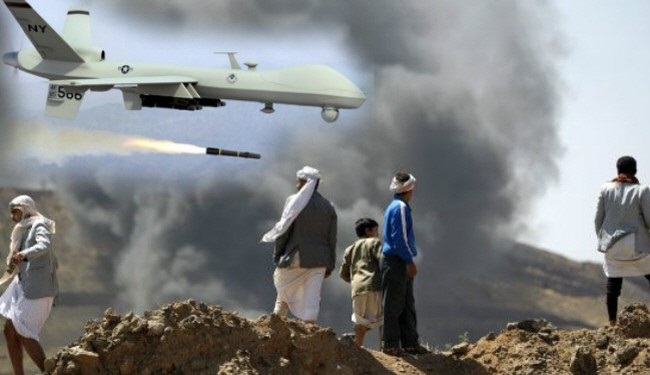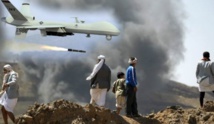The aircraft tried to target rebels at a roadblock on the southern outskirts of the Red Sea port of Khoukha, but the fighters fled to a market where they were attacked, the sources said.
The attack took place at the entrance to a market selling the mild narcotic leaf qat, which is very popular among Yemeni men.
A military source close to Saudi-backed President Abedrabbo Mansour Hadi said that by fleeing to the market, the rebels had used civilians as "human shields".
The rebel television channel Al-Masirah also reported the air strike, but give a slightly higher toll of 27 killed and said dozens more were wounded.
The Saudi-led coalition which has been battling Shiite Huthi rebels opposed to Hadi was not immediately available for comment.
The Arab force has come under repeated criticism over civilian casualties in Yemen.
In December, it acknowledged that it had made "limited use" of British-made cluster bombs but said it had stopped using them.
On Thursday, Amnesty International accused the coalition of using banned Brazilian-manufactured cluster munitions in raids on residential areas in northern Saada province, a Shiite stronghold.
The conflict in Yemen has left more than 7,400 people dead and 40,000 wounded since the coalition intervened on the government's side in March 2015, the United Nations says.
The attack took place at the entrance to a market selling the mild narcotic leaf qat, which is very popular among Yemeni men.
A military source close to Saudi-backed President Abedrabbo Mansour Hadi said that by fleeing to the market, the rebels had used civilians as "human shields".
The rebel television channel Al-Masirah also reported the air strike, but give a slightly higher toll of 27 killed and said dozens more were wounded.
The Saudi-led coalition which has been battling Shiite Huthi rebels opposed to Hadi was not immediately available for comment.
The Arab force has come under repeated criticism over civilian casualties in Yemen.
In December, it acknowledged that it had made "limited use" of British-made cluster bombs but said it had stopped using them.
On Thursday, Amnesty International accused the coalition of using banned Brazilian-manufactured cluster munitions in raids on residential areas in northern Saada province, a Shiite stronghold.
The conflict in Yemen has left more than 7,400 people dead and 40,000 wounded since the coalition intervened on the government's side in March 2015, the United Nations says.









 Home
Home Politics
Politics











